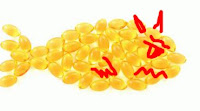Innovative plans are to be unveiled later today to turn London's massive Olympic Stadium into an enormous algal swamp following the 2012 Olympics as part of a new nutrition, health and sustainability scheme.
Following revelations of Gordon Brown's new proposed LOHAS LAW that will make it compulsory for for schools and hospitals to adopt a healthy and sustainable Meat free Monday, other secret plans to transform the NHS and save money have come to light.
Olympic Park Legacy Company chair Margaret Ford and chief executive Andrew Altman have apparently been left 'unimpressed' by West Ham Football club's bid for the Olympic stadium. "They'd have to be Manchester United to make it work and even then the sums don't add up on less than 2 games a week" revealed an aid.
More lucrative and viable negotiations have meanwhile taken place between two London based entrepreneurial functional food development companies and Algae specialists, Water4Life and Eau+, and government health ministers to transform the Olympic stadium in London's East End into a gigantic pond when the 2012 Olympics is over.
The plan is to seal up the entrances and fill the stadium with salt water to then use it for farming a special secret type of algae that is rich in omega 3 long chain fatty acids EPA and DHA revealed contractor
Health practitioners and particularly nutritionists are convinced that part of the reason for escalating preventable chronic diseases and ill health is a lack of these essential fats in our modern diet.
London Nutritionist Yvonne Bishop-Weston explains "Because meat is mass produced, with animals kept in unnatural conditions and fed an unnatural diet there is a widening discrepancy between the nutrients that are assumed to be in meat and actual modern levels. We are finding high levels of saturated fat and low levels of omega 3 fats in patients diets. Meanwhile studies are finding increasing levels of toxins in fish."
"Essential fats are essential for the quality and repair of every cell membrane in the body - a lack of the optimum balance of essential fats can lead to fertility problems, mood problems, skin problems, immune system problems, cognitive dysfunction, weight issues, hormonal imbalances, digestive problems, reduced heart health, visual impairment and erectile dysfunction"
Plans are being discussed to produce millions of tons of omega 3 rich algae that can be distributed free to school children and hospital patients via seaweed and algae shakes, and added to bread, pasta and even ice cream.
Businessman and health innovator Tom Brudenell-Bruce says "We already have 90% proof DHA rich algae for enhancing functional food products but we need to start producing algae on a massive scale if we want to get the price down to a 10th of the price of fish oil so that the government can afford to give V-Pure algae away for free"
Collaborators on the film 'The End of the Line' are delighted with the news and say "this investment is long overdue fishing is unsustainable and there are increasing levels of toxins to worry about too"
Campaigners are hoping Sir Richard Branson will get involved as algae can also be used as a fuel and is said to be one of the options that Branson is considering to make Virgin Airways much more sustainable than competitor airlines.


